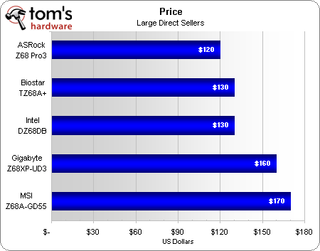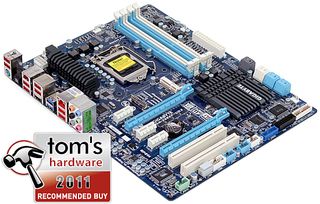From $100 To $160: Five Z68-Based Boards, Compared
Value-oriented system builders celebrate new-found performance and features as Intel continues pushing its mainstream platform towards the high-end. Today, we draw a line in the sand and consider five motherboards priced between $100 and $160.
Value Conclusion
Before we can assess value, let’s take a quick look at what today’s value-oriented performance motherboards currently cost:

ASRock deserves applause for including Lucidlogix's Virtu license on a motherboard priced at only $120. Yet, for a few dollars more, one could buy Biostar’s superb overclocker. Both of these boards come up a little short on even the most basic features though, and for that we can look to Intel’s DZ68DB. Buyers can break that tie on their own based on overclocking ambitions and connectivity needs.
That brings us to the Gigabyte versus MSI debate. A few days ago it seemed as though MSI's only issue was hitting ample volume with its board to push prices down to where our story required. We were ready to hand Gigabyte the value victory when MSI's Z68A-GD55 showed up on Newegg for the same $170 we'd seen elsewhere. But MSI pulled a rabbit out of its hat with a $20 mail-in-rebate.
A slight edge in overclocking could make MSI's $150 after-MIR price a better value to some buyers, though it also comes up around $10 shorter in features. At the end of the day, the fact that you have to send away to get $20 back (and we all know how many folks actually take that step) gives Gigabyte the narrow advantage here.
The problem is that all five of today’s products deserve an award: ASRock based on price alone, Biostar based on overclocking alone, Gigabyte based on features alone, Intel based on its combination of price and connectivity, and MSI based on its combination of features and overclocking. Handing out five awards to five vendors diminishes the value of giving the things out in the first place. But we can tell you which one we’d pick for any number of tasks.
Our kid brother gets the Z68 Pro3 because it’s cheap. He doesn’t need a bunch of features, and we don’t want to waste money on stuff he won’t use.
Our significant others get the DZ68DB because they have so many portable devices and peripherals. They don’t care what’s under the hood, and they won’t overclock.
Stay On the Cutting Edge: Get the Tom's Hardware Newsletter
Get Tom's Hardware's best news and in-depth reviews, straight to your inbox.
The tech-curious kid next door gets the TZ68A+ because he’s done such a great job of mowing the lawn. He’ll spend hours overclocking it to perfection, and it’s still cheap enough to give away.
For Tom’s Hardware editors, the choice is less clear. A few of us use FireWire on occasion, but not often enough to make it a primary consideration in motherboard selection. The Z68XP-UD3 also adds a PCIe 2.0 x1-based SATA controller, but few of us use more than six drives in our personal PCs. But we’d hate to pay even more to not get those features with MSI, even though the Z68A-GD55 is marginally more efficient and an insignificantly better overclocker.
After careful deliberation, Gigabyte’s Z68XP-UD3 gets our Recommended Buy award.

Most Popular

